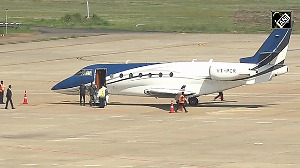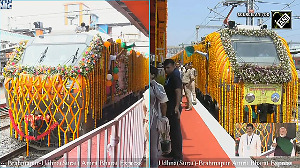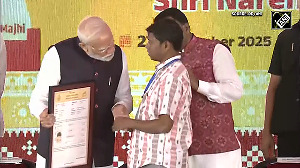Undaunted by the February bomb attack on Samjhauta Express, India and Pakistan on Monday extended till 2010 a bilateral agreement to run passenger train and freight services between the two countries.
A six-member Indian railway delegation headed by Advisor (Traffic), Suhbas Ranjan Thakur, signed an agreement with his Pakistani counterpart extending the bilateral pact on running the Samjhauta Express between Lahore and New Delhi and Thar Express between Khokhrapar and Munabao for the next three years.
The pact also includes continuing the freight services till 2010, Thakur told PTI.
The Indian delegation also called on Pakistan Railway Minister Sheikh Rashid, who criticised the Indian Railway's handling of the bomb explosions on Samjhauta Express in which 67 passengers, mostly Pakistanis, were killed.
Rashid told the media later that the two countries decided to go ahead with the train services despite the setback and that he discussed some of the concerns of the Pakistani side in this regard.
Thakur said that one of the main decisions taken in the aftermath of Samjhauta bomb attack was that no-one would be
permitted to travel without reservation in both trains carrying about 150 passengers each.
Also, a full list of passengers with proper details would be maintained, considering that there was confusion over the
identity of some passengers who were killed in the Samjhauta tragedy.
The security aspects would be separately discussed between Pakistani and the Indian High Commission officials, Thakur said.
The new element added to the previous agreement, which ended on January 28, was that the Thar Express would have two additional bogies to meet the rush of passengers. The train commutes between Karachi to Khokhrapar in Sindh and Munabao in Rajasthan.
Previously, the train had the provision for seven coaches with two extra to meet the rush. Now, it would have nine bogies with provision for two extra compartments.
The Samjhauta Express, however, will continue to have 12 bogies as in the past.
Keeping in mind the security concerns, the two sides have agreed to limit the luggage for each passenger to 50 kilogram for the first class travellers and 35 kilogram for the rest. For any extra luggage, the passengers would be charged 10 times the base rate.
This is mainly aimed at deterring the passengers to limit their luggage which would be put in separate break vans, Thakur said.
He said India suggested to the Pakistani side to allow the freight traffic on the Kokhrapar-Munabao route, specially in view of the request made by Pakistan Prime Minister Shaukat Aziz during his recent visit to New Delhi to attend the SAARC summit to permit cement exports from Pakistan to India.
Since most of the cement factories in Pakistan were located in Balochistan and southern Punjab, it would be cheaper for Pakistan to export cement to India through the Kokhrapar-Munabao route, Thakur said.





